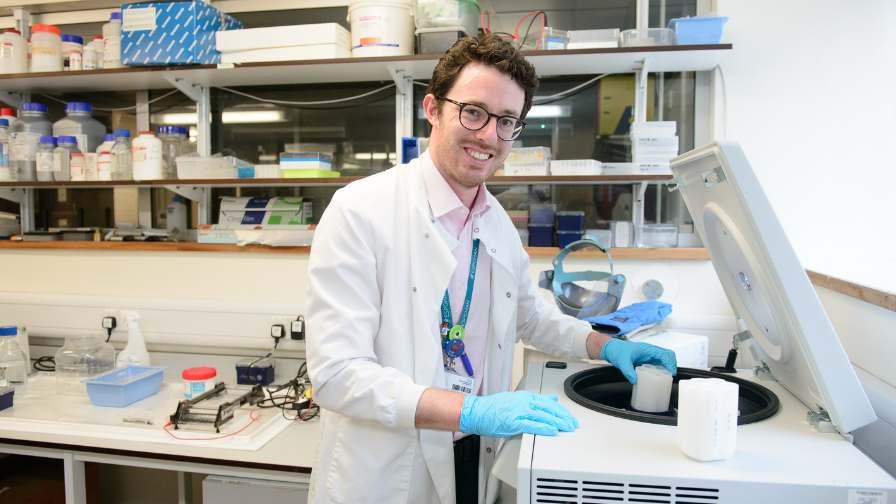With the help of funding from children’s charity Action Medical Research, researchers at the University of Southampton and Southampton Children’s Hospital are advancing understanding of what causes Crohn’s disease in children and are developing a test to determine which young people with Crohn’s disease are at a higher risk of developing serious complications.
Crohn’s disease has been linked to a mutation in a gene called NOD2, which has been shown to result in a higher risk of a serious complication leading to strictures (narrowing of the gut). In the study, a change in the NOD2 gene was found in approximately 8% of children with Crohn’s disease and was shown to be linked to a higher risk of strictures.1 The researchers used a new specific type of genetic tool in combination with clinical information to predict which patients are most likely to develop strictures. This type of analysis could result in early identification of young people with Crohn’s disease who are at risk of strictures and help personalise care for these children.2 Alongside this, results from the team in Southampton have informed new national guidelines on genomic testing for those with rare types of inflammatory bowel disease (IBD) caused by genetic problems outside of the NOD2 gene.1,3 Results from the team also found additional features, such as specific pattern of gene activity in the gut that may be linked to a lower risk of flare-ups and could help identify children who need more aggressive treatment sooner.4

Crohn’s disease is the most common type of Inflammatory bowel disease (IBD) in children. IBD is caused by inflammation in the gut, which can result in abdominal pain, diarrhoea, weight loss and tiredness. In the UK alone, over half a million people live with the condition, one in every 123 people.5 Around one in four people with Crohn’s are diagnosed before the age of 20,6 and the incidence of IBD has doubled for children and young people in the last 10 years.7 Young people often have flare-ups, followed by recovery or periods of less active disease controlled by medications.6 Flare-ups can be very debilitating and affect children’s self-esteem, performance at school, relationships, and social lives.
Commenting on the significance of the study results, Dr James Ashton, Associate Professor at the University of Southampton, and Consultant Paediatric Gastroenterologist at Southampton Children’s Hospital says, “The most important and clinically relevant finding was the identification of a genetic diagnosis in 8% of the children in our study. We have identified what appears to be the main driver of disease in this group of patients and we believe that these patients have a specific type of Crohn’s disease related to changes in the NOD2 gene. We continue to investigate NOD2 further and are building a clinical tool to predict the risk of developing a potentially serious complication where parts of the intestine become narrowed.”
Danielle, mum to three-year-old Mia, who has Crohn’s disease, says: “Mia was diagnosed with Crohn’s when she was two. She was in so much pain and at first we didn’t know what was causing it and when it would go away. We coped and had good and bad days. Mia is much better now and takes medication every day, but we are concerned that she could have flare ups in the future.”

Mia’s family have undergone genomic testing as part of Dr Ashton’s research: “It’s a really good thing that researchers are using genetic testing to help children with Crohn’s disease. As parents, we didn’t realise something like Crohn’s could be picked up in children as young as Mia, so to find out that there is something to predict complications is a game-changer for families like ours whose child has been impacted quite severely. We’ve had to learn as we go along, so to be able to look out for symptoms and be more prepared for flare ups would be very helpful,” says Danielle.
Crohn’s disease is triggered by a combination of genetic and environmental factors which are specific for an individual patient or family, but the exact mechanisms behind the disease remain somewhat elusive. Treatments for the disease include immunosuppressive medications and nutritional therapies, and on occasions surgery. More research into the cause of Crohn’s disease is needed to better understand the condition and develop new ways to diagnose and treat it.
The use of genetic testing in very young children with IBD is now a routine part of NHS care, with an estimated 100 children and young people already benefitting from the newly available screening, with adoption led by teams at Oxford, Birmingham, Great Ormond Street and Southampton.8 Improving and implementing additional genetic diagnostic and prediction tools developed by the researchers will be a significant step forward in the management of Crohn’s disease.
Dr Caroline Johnston, Senior Research Manager at Action Medical Research, comments: “We are delighted with the results and potential of this research, which is already influencing clinical practice and benefitting children with Crohn’s disease. Dr Ashton was one of Action Medical Research’s Research Training Fellows. He is an example of one of the many Action Fellows whose research has led to the development of new diagnostic tests and treatments for life-threatening and life-limiting conditions, or informed changes to guidelines and policies.”
-Ends-
Notes to editors
Images available to download here: https://www.dropbox.com/scl/fo/6ar23084ra0mtcsg4jvcg/AIT4W9nC7LnAvsYFF7MxCPM?rlkey=a2zpf98j6wig8tiwxxvut6hkx&st=ud9v33km&dl=0.
For more information on Action Medical Research, please contact Grace Wardley, Communications and Engagement Officer:
T: 01403 327 412
Follow us on Twitter/X at @actionmedres and @amr_events
Like our Facebook page at @actionmedres
Follow us on Instagram at @actionmedres and @actionevents
About Action Medical Research
Action Medical Research is the leading UK-wide charity dedicated to saving and changing children’s lives through medical research. For over 70 years we’ve helped pioneer ways to prevent disease and develop treatments benefiting millions of people. Our research has helped to beat polio in the UK, develop ultrasound in pregnancy, fight meningitis and prevent stillbirths. But we urgently need to develop more new treatments and cures for sick babies and children and we can’t do it without you.
Join our fight for little lives today.
Charity reg. nos 208701 and SC039284.
References
- J. Ashton, et al, 2020. “Genetic Sequencing of Pediatric Patients Identifies Mutations in Monogenic Inflammatory Bowel Disease Genes that Translate to Distinct Clinical Phenotypes,” Clin Transl Gastroenterol, vol. 11, no. 2, p. e00129.
- J. Ashton, et al. 2023. Prediction of Crohn’s Disease Stricturing Phenotype Using a NOD2-derived Genomic Biomarker. Inflammatory Bowel Diseases, 2023, 29, 511–521.
- J. Kammermeier, et al, 2023. “Genomic diagnosis and care co-ordination for monogenic inflammatory bowel disease in children and adults: consensus guideline on behalf of the British Society of Gastroenterology and British Society of Paediatric Gastroenterology, Hepatology and Nutrition,” Lancet Gastroenterol Hepatol, vol. 8, no. 3, pp. 271-286.
- Ashton. et al, 2021. Ileal Transcriptomic Analysis in Paediatric Crohn’s Disease Reveals IL17- and NOD-signalling Expression Signatures in Treatment-naïve Patients and Identifies Epithelial Cells Driving Differentially Expressed Genes. Journal of Crohn's and Colitis, 2021, 774–786.
- University of Nottingham, 2022. Rates of Crohn’s and Colitis have been vastly underestimated for decades, says new study. Available at: https://www.nottingham.ac.uk/news/rates-of-crohns-and-colitis-have-been-vastly-underestimated-for-decades-says-new-study. [Accessed August 2024].
- Rosen M, Dhawan A and Saeed S, 2015. Inflammatory Bowel Disease in Children and Adolescents, ”JAMA Pediatrics, vol. 169, no. 11, pp. 1053-60.
- Green et al. 2024. Sustained Increase in Paediatric Inflammatory Bowel Disease Incidence Across the South West United Kingdom Over the Last 10 Years. Inflammatory Bowel Diseases, izad302.
- NHS Central South Genomics, 2024. Clinical genomics for monogenic IBD and congenital diarrhoea improving mainstream care pathways. Available at: https://centralsouthgenomics.nhs.uk/transformation-projects-patients/monogenic-inflammatory-bowel-disease/. [Accessed August 2024].
